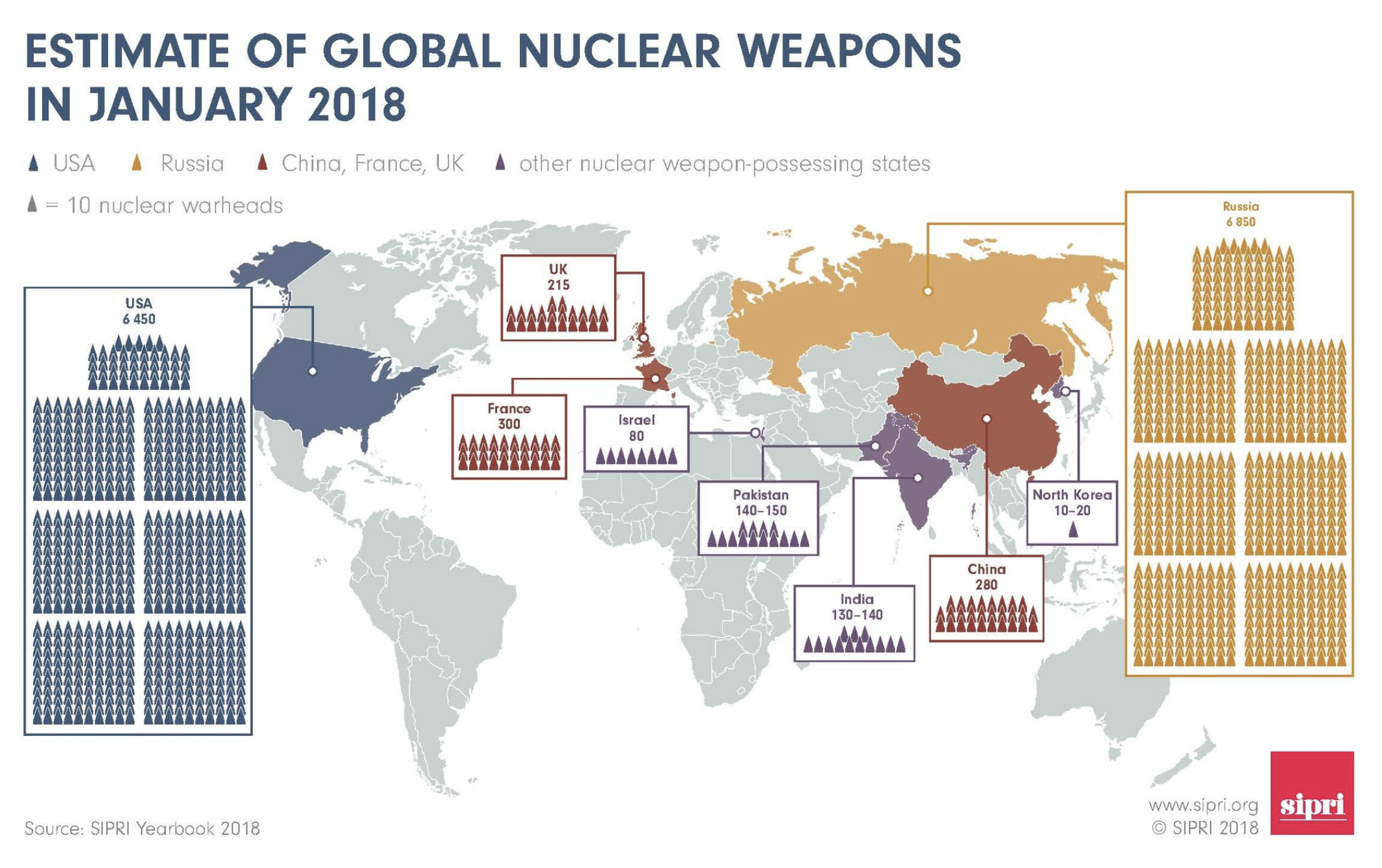The state of the world’s nuclear arsenal in 3 charts

Testing an unarmed a US Trident II D5 missile — nuclear powers are all embarked on weapons modernization programme Image: REUTERS

Get involved with our crowdsourced digital platform to deliver impact at scale
Stay up to date:
Nuclear Security
This article is part of the World Economic Forum's Geostrategy platform
At the start of 2018 nine states—the United States, Russia, the United Kingdom, France, China, India, Pakistan, Israel and the Democratic People’s Republic of Korea (North Korea) — possessed approximately 14,465 nuclear weapons.
This marked a decrease from the approximately 14,935 nuclear weapons that SIPRI estimated these states possessed at the beginning of 2017.

The decrease in the overall number of nuclear weapons in the world is due mainly to Russia and the US — which together still account for nearly 92% of all nuclear weapons — further reducing their strategic nuclear forces pursuant to the implementation of the 2010 Treaty on Measures for the Further Reduction and Limitation of Strategic Offensive Arms (New START).
Despite making limited reductions to their nuclear forces, both Russia and the US have long-term programmes under way to replace and modernize their nuclear warheads, missile and aircraft delivery systems, and nuclear weapon production facilities.

The USA’s most recent Nuclear Posture Review (NPR), published in February 2018, reaffirmed the modernization programmes and approved the development of new nuclear weapons.
The NPR also emphasized expanding nuclear options to deter and, if necessary, defeat both nuclear and ‘non-nuclear strategic attacks’.
“The renewed focus on the strategic importance of nuclear deterrence and capacity is a very worrying trend,’ says Ambassador Jan Eliasson, Chair of the SIPRI Governing Board. ‘The world needs a clear commitment from the nuclear weapon states to an effective, legally binding process towards nuclear disarmament.

The nuclear arsenals of the other nuclear-armed states are considerably smaller, but all are either developing or deploying new nuclear weapon systems or have announced their intention to do so.
India and Pakistan are both expanding their nuclear weapon stockpiles as well as developing new land-, sea- and air-based missile delivery systems. China continues to modernize its nuclear weapon delivery systems and is slowly increasing the size of its nuclear arsenal.
In 2017 North Korea continued to make technical progress in developing its nuclear weapon capabilities, including the test of—what was claimed to be—a thermonuclear weapon, in September. North Korea also demonstrated unexpected rapid progress in the testing of two new types of long-range ballistic missile delivery systems.
“Despite the clear international interest in nuclear disarmament reflected in the conclusion in 2017 of the Treaty on the Prohibition of Nuclear Weapons, the modernization programmes under way in the nuclear weapon-possessing states indicate that genuine progress towards nuclear disarmament will remain a distant goal,” says Shannon Kile, Senior Researcher with the SIPRI Disarmament, Arms Control and Non-proliferation Programme.
The SIPRI Yearbook 2018 assesses the current state of armaments, disarmament and international security.
Don't miss any update on this topic
Create a free account and access your personalized content collection with our latest publications and analyses.
License and Republishing
World Economic Forum articles may be republished in accordance with the Creative Commons Attribution-NonCommercial-NoDerivatives 4.0 International Public License, and in accordance with our Terms of Use.
The views expressed in this article are those of the author alone and not the World Economic Forum.
The Agenda Weekly
A weekly update of the most important issues driving the global agenda
You can unsubscribe at any time using the link in our emails. For more details, review our privacy policy.
More on Resilience, Peace and SecuritySee all
Lisa Satolli
April 18, 2024
Kate Whiting
April 4, 2024
Spencer Feingold
March 22, 2024
Weekend reads: Our digital selves, sand motors, global trade's choke points, and humanitarian relief
Gayle Markovitz
March 15, 2024
Kalkidan Lakew Yihun
March 11, 2024
Liam Coleman
March 7, 2024






